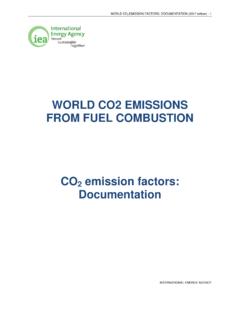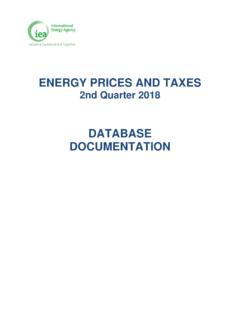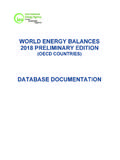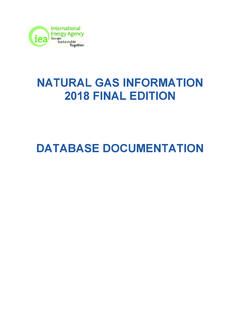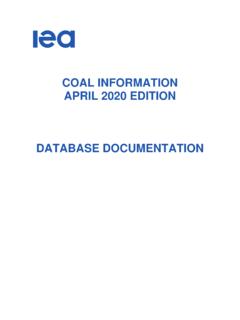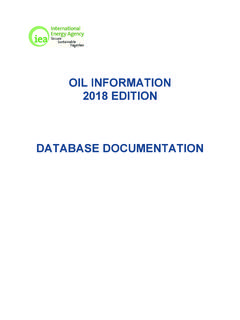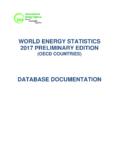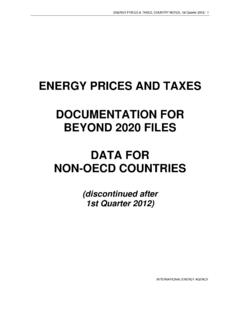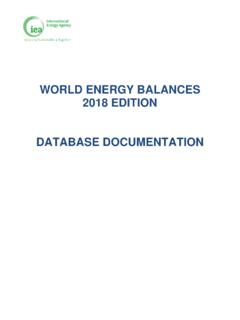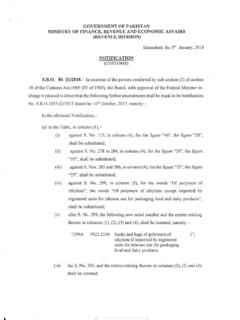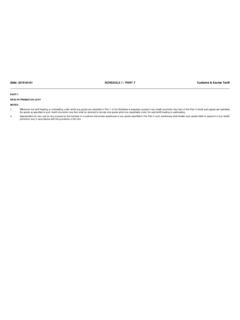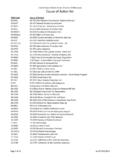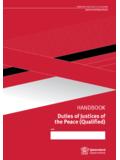Transcription of COUNTRY NOTES - International Energy Agency
1 Energy PRICES AND TAXES: COUNTRY NOTES (1st Quarter 2018) COUNTRY NOTES International Energy Agency 2 - Energy PRICES AND TAXES: COUNTRY NOTES (1st Quarter 2018) OECD Countries Australia Austria Belgium Canada Chile Czech Republic Denmark Estonia Finland France Germany Greece Hungary Iceland Ireland Israel Italy Japan Korea Latvia Luxembourg Mexico Netherlands New Zealand Norway Poland Portugal Slovak Republic Slovenia Spain Sweden Switzerland Turkey United Kingdom United States International Energy Agency AUSTRALIA Energy PRICES AND TAXES, 1st Quarter 2018 - 3 AUSTRALIA Sources Data for all Energy products, including Energy price in-dices, are provided on a quarterly basis by the Depart-ment of the Environment and Energy (DEE). Data collection methodology Oil products Wholesale fuel prices for oil products ( automotive diesel, gasoline, LPG) are determined by the market with reference to import parity pricing models that take into ac-count regional oil product prices as well as shipping costs (freight, wharfage, insurance) and any quality premium associated with compliance with Australian fuel standards.
2 The relationship between wholesale prices and retail prices varies depending on proximity to local refineries and import terminals, local market conditions ( sales volumes) and the degree of competitive discounting. Prices for automotive diesel, unleaded regular gasoline, unleaded premium gasoline (95 RON) and automotive LPG are derived by the DEE based on a quarterly report commissioned to the Australian Institute of Petroleum (AIP), which contains monthly average retail end-use fuel prices in the eight Australian state/territory capital cities. These cities account for 66% of Australia s total popula-tion, according to the Australian Bureau of Statistics (ABS) Population by Age and Sex, Regions of Australia, 2014 publication. A national weighted average price for each product is calculated using the monthly state prices from the AIP report and monthly state-level sales data from the DEE s petroleum statistics.
3 Ex-tax prices are calculated by subtracting the applicable excise tax rates and the Goods and Services Tax (GST) from the end-use prices, sourced from the Australian Taxation Office (ATO). As described in the Energy Taxation section of this doc-ument, oil products used for commercial purposes are subject to a series of tax credits, which reduce the effec-tive tax rates paid by this consumer category. For this reason, total taxes effectively paid by commercial users are currently not available. Natural gas Natural gas prices for industry, households and electrici-ty generation are currently not available. There is no single wholesale price for gas. A transfer price is calculated for the cost of gas that is used to pro-duce LNG. Steam and coking coal From 1990 onwards, coal prices for industry, households and electricity generation are currently not available. Electricity Electricity prices for industry are currently not available.
4 Annual electricity prices for households correspond to fiscal years which run from 1 July to 30 June. For exam-ple, the annual price shown for 2013 refers to the period between 1 July 2012 and 30 June 2013. Prices for households are sourced from the Australian Energy Market Commission s (AEMC) Residential Electricity Price Trends, and refer to the average ex-penditures per MWh received via a survey that samples households Australia-wide. These averages are weighted by the number of residential connections in each juris-diction and are therefore considered to be most closely representative of the most populous jurisdictions of Australia. Energy price indices Annual and quarterly indices are 12-month and 3-month averages, respectively. Indices are sourced from the Australian Bureau of Statis-tics (ABS). Wholesale indices refer to the Producer Price Index (PPI), Input to the Manufacturing industries ( ) series.
5 Retail indices refer to the Consumer Price Index (CPI), weighted average of eight capital cities ( ) series. Retail indices for oil products refer to automotive fuels (series ID: A2328636K). Wholesale and retail indices for electricity refer to electricity (series ID: A2309192C and A2328141J, respectively). Wholesale indices for natural gas refer to natural gas (series ID: A2309195K). Retail indices refer to gas and other households fuels (series ID: A2331921F). Energy taxation VAT The Goods and Services Tax (GST), in place in Australia since 1 July 2000, is a VAT-equivalent ad valorem tax that is refunded for purchases for commercial purposes. International Energy Agency 4 - Energy PRICES AND TAXES, 1st Quarter 2018 AUSTRALIA Therefore, it is not included in prices shown for industry and electricity generation, and for automotive fuels for commercial use. Since its introduction in 2000, the rate has been kept constant at 10% and applies to the excise-inclusive price of gasoline and diesel, biofuels and gaseous fuels.
6 From To % now 10 Excise tax Excise taxes in Australia are levied at a national level on oil products. The carbon pricing mechanism has been abolished from 1 July 2014 with the repeal of the Clean Energy Act 2011. Tax applicability table (not exhaustive) HSFO/LSFO LFO Diesel Gasoline LPG Natural gas Steam coal Coking coal Electricity Fuel tax Fuel tax Fuel tax in Australia is a form of excise taxation applica-ble to oil products used for transportation or heating, as well as liquefied or compressed natural gas for transpor-tation. In its current form, the fuel tax is legally defined in the Fuel Tax Act of 2006, which describes the system for fuel tax credits for commercial and non-commercial users. The Excise Act of 1901, the Excise Tariff Act of 1921, the Customs Act of 1901 and the Customs Tariff Act of 1995 establish the liability system for this tax. Registered commercial entities and some non-profit or-ganizations are entitled to fuel tax credits for taxable oil products used for conducting their commercial activities.
7 Fuel tax rates on fuel and oil products (other than avia-tion fuels) are currently indexed twice a year in line with the consumer price index (CPI). This indexation mecha-nism, in place since 1983, was interrupted in 2001 and re-introduced on 10 November 2014. Indexation current-ly takes place, every year, on 1 February and 1 August. From 1 July 2016 onwards, domestically manufactured and imported ethanol and biodiesel are subject to fuel tax following the rates defined by the Excise Tariff Amend-ment (Ethanol and Biodiesel) Act 2015. Pursuant to these amendments, the excise rate on both ethanol and biodiesel is set as a percentage of the excise rate for gas-oline. From 1 July 2017, the excise rate for ethanol and biodiesel is set at and , respectively, for the 2017-2018 financial year. Gaseous fuels, including LPG, liquefied natural gas (LNG) and compressed natural gas (CNG), used for road transportation, are subject to fuel tax.
8 Uses other than transportation are tax-free. The rates shown in the tax rate tables at the end of this section refer to non-commercial users not eligible for tax credits under the current legal framework. Electricity generation is not taxed, but the fuels used for production are. Fuel tax From To Heavy fuel oil (AUD/tonne) Light fuel oil (AUD/1000l) Automotive diesel (AUD/l) Gasoline (AUD/l) Automotive LPG (AUD/l) International Energy Agency AUSTRALIA Energy PRICES AND TAXES, 1st Quarter 2018 - 5 From To Heavy fuel oil (AUD/tonne) Light fuel oil (AUD/1000l) Automotive diesel (AUD/l) Gasoline (AUD/l) Automotive LPG (AUD/l) Product specifications Automotive diesel Premium unleaded (95 RON) gasoline Regular unleaded gasoline Automotive LPG Natural gas Quality Automotive diesel oil (ADO) Premium unleaded petrol (PULP) Unleaded petrol (ULP) LPG Octane number 95 RON 91 RON Density (kg/l) Sulphur content (%)
9 GCV (kcal/m3) 9 506 International Energy Agency 6 - Energy PRICES AND TAXES, 1st Quarter 2018 AUSTRIA AUSTRIA Sources Data for light fuel oil for households, automotive diesel for non-commercial users and all gasoline grades are provided on a quarterly basis by the Federal Ministry of Science, Research and Economy (BMWFW). Data for heavy fuel oil for electricity generation, auto-motive diesel for commercial users, as well as light fuel oil, steam coal, natural gas and electricity for industry are provided on a quarterly basis by Statistics Austria. Data for natural gas and electricity for households are provided on a quarterly basis by Energie-Control Austria (E-Control). Prices and taxes data for low sulphur fuel oil are based on weekly data published in the European Commis-sion s Weekly Oil Bulletin. Retail Energy price indices are based on data published by Eurostat.
10 Data collection methodology Oil products Annual end-use for prices for heavy fuel oil for electrici-ty generation, light fuel oil for industry and automotive diesel for commercial users are calculated by Statistics Austria based on a yearly survey of fuel quantities and expenditures incurred by around 3000 of the biggest industrial companies throughout the COUNTRY . The survey is estimated to cover around 80% of total sectoral consumption. End-use prices for these products are calculated as the ratio between total expenditure and total volumes con-sumed. The ex-tax price is then calculated by subtracting the applicable, legally established tax components from the end-use price. Quarterly prices are estimated by Statistics Austria using the changes in the quarterly wholesale price index. Data are subsequently revised at the end of the yearly cycle. Prices for low sulphur fuel oil are derived from data pub-lished in the European Commission s Weekly Oil Bulle-tin, which reports weekly ex-tax and end-use prices for a series of oil products in all EU countries.
